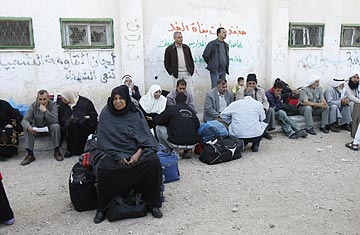
Palestinians wait at the Rafah border point to cross into Egypt from the Gaza Strip
(2 of 2)
Israel controls the Palestinian population registry, and according to Al-Mezan, it is nearly impossible for Palestinians like El Frani to obtain an ID card. "There is only one mechanism, which is family reunification," says Mahmoud Abu Rahma, the group's communications director. "It's very complex and it takes years of trying to obtain this ID card."
Craig and Cindy Corrie, the parents of Rachel Corrie, an American peace activist who was killed by an Israeli bulldozer in Gaza in 2003, were also at Rafah Crossing that day, leading a delegation of nine Americans and one Canadian into Gaza to meet with local NGOs and attend the Rachel Corrie Ramadan Football Tournament. They spent two days phoning contacts in Cairo and negotiating with border officials before they were allowed to cross.
The Corries, who had made three previous trips to Gaza, said that when they visited the Strip for the first time, following their daughter's death, Craig Corrie was shot at by Israeli forces. "So in a very personal way, we witnessed that kind of violence," says Cindy Corrie, waiting at Rafah gate. "But there's another kind that has to do with squeezing people to such an extreme degree, I think with the intent of pushing people out, or at least pushing responsibility for those people to someplace else. And I think this border reflects that."
Getting through Rafah ultimately feels like a tremendous feat. Once on the other side, the bus pulls away from the Egyptian customs terminal, past Egyptian tanks, and into no-man's land before a sign welcomes you to Palestine. As the bus moved through the checkpoint, the Palestinians who had made it in began to applaud. They cheered and thanked God; others called relatives on their mobile phones. It was an emotional moment, yet paradoxical all the same, given that many might never be able to get back out.
Richard Goldstone, author of the scathing U.N. report released this week, which accused both Israel and Hamas of war crimes during Operation Cast Lead last winter, also had to pass through Rafah to conduct his investigation in June. Israel had refused to cooperate with the mission, denying Goldstone, a South African Jew, and his team visas to enter the Jewish state. He, of course, got back out. But for the Palestinians on the inside, escaping through Rafah requires special permission. "The Egyptians only open it for humanitarian situations — sick people, students, and residents outside with foreign passports," says Issam Younis, the director of Al-Mezan.
"I don't like the analogy of a prison," says John Ging, chief of the United Nations Relief and Works Agency (UNRWA) in Gaza, dispelling a description that many Palestinians themselves use. There is a tendency, he says, to view prisoners as deserving of their suffering for having committed some crime. "Nothing could be further from the truth... They're like you, if one morning, you woke and someone had transported you to a prison. What do you do? How do you cope with this? You're now imprisoned, in a prison, where you shouldn't be."
